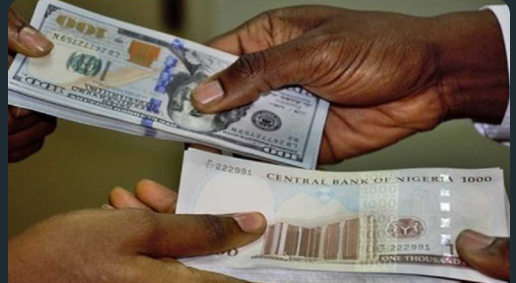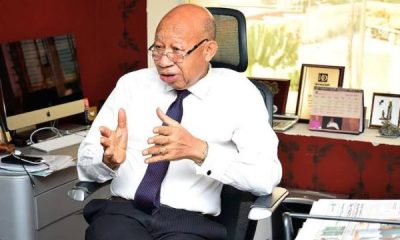Economy
US oil imports from Nigeria to drop as Trump plans energy emergency order

The President Trump planned an executive order and declaration of a national energy emergency, targeted at enhancing the United States oil and gas production could impact on Nigeria’s oil demand and revenue generation.
This was even as prices of oil, including Nigeria’s Bonny Light dropped to $80 per barrel from $83 per barrel, yesterday, as traders await U.S. President-elect Donald Trump’s inauguration in the hope of some clarity on his policy agenda.
However, the United States used to import a bulk of its crude oil from Nigeria, but the commencement of shale oil, deliberate government policy and other factors, reduced the nation’s oil and gas import in recent times.
Despite the reduction, recent data indicated that the United States oil and gas import from Nigeria was worth $4.73 billion in 2023.
According some experts, the revenue would likely decrease in 2025 and beyond following President Trump executive order and declaration of a national energy emergency.
In an interview with Vanguard, yesterday, an economist and Chief Executive Officer, Centre for the Promotion of Private Enterprise, CPPE, Dr Muda Yusuf, said: “Naturally, if investments in oil and gas increase in the United States and the US of course is a major oil producer that will increase the global supply. If global supply increases, energy prices are likely to fall.
“So, if energy prices fall, of course, that has implications for our own revenue. So it’s likely to negatively impact on our oil price, on our oil revenue but it may be positive for businesses because a reduction in crude oil price or commodity or global oil price typically reduces the cost of petroleum products, including the Premium Motor Spirit, PMS, also known as petrol, diesel and jet fuel.
“However, it’s a double-edged sword as changes, if the price increases; it will favour the government and penalize the private sector, who uses energy. If the price drops, it penalizes the government and benefits the citizens and investors because their energy costs will drop.
“That is one implication of the Trump presidency. The second implication is, if he’s able to calm down the situation between Russia and Ukraine. Russia is a major oil producer as well, a major gas producer.
“So, he’s able to calm down Russia and Ukraine and he has the potential to do that because it is part of the commitment that he has made.
“If he’s able to do that, then we are likely to see more production of oil. We are likely to see the lifting of sanctions on Russia and if that happens, oil production will increase and prices will fall. Again, that will affect revenue negatively, but it will benefit businesses because cost of energy will drop.
“So, that is the nexus for me between what is happening with Trump policies and our domestic economy, especially the oil and gas sector.”
On his part, a Port Harcourt-based energy analyst, Dr. Bala Zakka, said: “Major importers from Nigeria, indirectly encourage our nation to be lazy, exporting crude oil instead of processing to add more value to the economy.
“I strongly believe that by reducing importation through his policies, President Trump would encourage increased refining in Nigeria and other African nations. We need to expand our refining capacity to refine more petroleum product and derivatives, capable of adding value to the domestic economy.”
Also, the National President of Oil and Gas Service Providers Association of Nigeria, OGSPAN, said: “Every nation continuously reviews its environment and takes decisions on the best ways and means to grow its economy. Nigeria should do the same in order to reduce dependence on oil and other economies.”
Meanwhile, the Petroleum Products Retail outlets Owners Association of Nigeria, PETROAN, has assured consumers that the coming on stream of the Dangote Refinery and the NNPC Limited owned Port Harcourt refinery would ensure easy flow of petrol during the Yuletide season.
PETROAN in a statement by its National Public Relations Officer, Dr Joseph Obele said the petrol supply agreement reached with the 650,000 barrels per day Dangote Refinery would avert any possible shortage of premium motor spirit during the period.
This, according to Dr Obele, is due to the efforts of PETROAN distribution technical committee incharge of planning and execution of zero-fuel scarcity strategy.
“We are happy that Nigerians are going to travel effortlessly during this period of the year”, the Group added.
Recall that the National President of PETROAN, Dr Billy Gillis-Harry, on Monday 2nd December 2024 led the negotiation team of the association to a fruitful strategic business meeting with the management of Dangote Refinery in Lagos.
PETROAN noted that the “sealing of a transactionary deal with Dangote Refinery was the aftermath of a successful buyer-seller negotiation and agreement secured by PETROAN at the strategic meeting.
“PETROAN National President commended the Vice President of Dangote group & Managing Director of Dangote Refinery, Mr. Devakumar V. G. Edwin, for his cooperation and strategies deployed so far to make petroleum products available to all Nigerians throughout the end of year festivities and beyond.”
Economy
Mobile Money transactions hit $1.68trn in one year

Mobile money platforms processed about 108 billion transactions valued at $1.68 trillion in 2024, according to GSMA’s ‘State of the Industry Report on Mobile Money 2025’ report released Tuesday.
GSMA’s mobile money programme works to advance the mobile money ecosystem of communities that lack access to more traditional banking services. The global body for telecom operators stated that mobile money transaction volumes increased by 20 percent year-on-year, while transaction values grew by 16 percent, up from a 13 percent increase in 2023.
“Transaction volumes and values for mobile money accounts experienced robust double-digit growth in 2024. Approximately 108 billion transactions, totalling over $1.68 trillion, were processed through mobile money accounts in 2024,” the report said.
Vivek Badrinath, director general of GSMA, said mobile money has emerged as a powerful driver of financial inclusion and economic growth. “Its continued success depends on supportive regulatory environments that promote innovation, accessibility, and help unlock the full socio-economic potential.
“To ensure mobile money remains accessible, affordable, and safe, it is vital for governments and regulators to work with financial service providers to support financial literacy programs, empowering underserved populations and opening new opportunities for financial decision-making,” he said.
The report stated that the GDP of countries with mobile money services increased by approximately $720 billion by 2023, reflecting a 1.7 percent increase. In Sub-Saharan Africa, mobile money added about $190 billion to GDP in the same year.
“The region remains the leader in mobile money, with active accounts increasing notably in East and West Africa. East Africa was highlighted for its growth in active accounts in 2024, followed by Southeast Asia and West Africa. Countries in East Asia-Pacific, including Cambodia, Fiji, the Philippines, and Vietnam, also demonstrated growth, attributed to favorable regulatory conditions.”
GSMA noted that mobile money providers in East Asia-Pacific have evolved to offer comprehensive financial services, with 44 percent providing credit services by June 2024. However, challenges persist, particularly for women, as eight of the 12 surveyed countries reported disparities in mobile money ownership based on gender.
“Nearly 60 percent of mobile money providers are addressing these gaps by implementing digital literacy initiatives,” the report said.
Mobile money reached two significant milestones in 2024, surpassing two billion registered accounts and over half a billion active monthly users across the globe. The industry took 18 years to achieve one billion registered accounts and 250 million active users from 2001, but this has doubled in the last five years.
Economy
SEE Black Market Dollar To Naira Exchange Rate In Lagos, FCT, April 7th 2025

The local currency (abokiFx) opened at ₦1,560.00 per $1 at the parallel market, otherwise known as the black market, today, Monday, 7 April 2025, in Lagos, Nigeria, after it closed at ₦1,550.00 per $1 on Sunday, 6 April 2025.
Black market dollar to naira exchange rate today, 7 April 2025, also known as Aboki forex, can be accessed below.
NOTE: The exchange rate changes hourly. It depends on the volume of dollars available and the Demand. What this means is that…you can buy or sell 1 dollar at a certain rate and the price can change (high or low) within hours.
The official naira black market exchange rate in Nigeria today, including the Black Market rates, Bureau De Change (BDC), and CBN rates. Please note that the exchange rate is subject to hourly fluctuations influenced by the supply and demand of dollars in the market. As of now, you can purchase 1 dollar at a certain rate now however, it’s important to remember that the rate can shift (either upwards or downwards) within hours.
Economy
Crude prices slump to $65 first time since 2021

Oil prices plunged this week to $65 per barrel as the United States import tariffs and an unexpected OPEC+ supply hike erased $10 per barrel from global benchmarks.
The price appreciated last week when US President Donald Trump imposed tariffs on any country that buys crude from Venezuela.
However, oil prices turned around the corner as of Friday, with Brent falling to $65, the first time since 2021.
According to oilprice.com, the combined effect of Trump’s import tariffs, OPEC+’s inopportune decision to speed up the unwinding of production cuts, and China’s retaliatory actions wiped off $10 per barrel from global oil prices, “with ICE Brent falling below $65 per barrel for the first time since August 2021.”
The US West Texas Intermediate crude futures lost $4.96, or 7.4 per cent to end at $61.99.
“Seeing backwardation barely change compared to the beginning of the week, one could assume that US tariffs are the defining factor for the price change. Nevertheless, this week will not go down well in the history of oil markets,” oilprice.com reports.
China’s retaliatory tariffs on US goods have escalated a trade war that has led investors to price in a higher probability of recession.
China, the world’s top oil importer, announced it will impose additional tariffs of 34 per cent on all US goods from April 10.
According to Reuters, nations around the world have readied retaliation after Trump raised tariffs to their highest in more than a century.
Aside from the tariffs, another factor that further pressured oil prices was the Organisation of the Petroleum Exporting Countries and Allies’ decision to advance plans for output increases.
The group now aims to return 411,000 barrels per day to the market in May, up from the previously planned 135,000 bpd.
-

 News13 hours ago
News13 hours agoOERAF held memorial lecture on conflict resolution, security/safety of community in Nigeria
-

 News23 hours ago
News23 hours agoJust in: Founder of Diamond Bank and ex-chairman of MTN, Paschal Dozie is dead
-

 News19 hours ago
News19 hours agoTRADE WAR! U.S. angry over Nigeria’s import ban on 25 products
-

 Sports23 hours ago
Sports23 hours agoReal Madrid keeping tabs on Victor Osimhen
-

 News19 hours ago
News19 hours agoINTERVIEW: Introduction of Child Rights Curriculum In Nigerian Universities Will Take CRA to Families – Dr Obiorah Edogor
-

 News23 hours ago
News23 hours agoOERAF Executive Director Dr Akpodiete, Held Memorial lecture on Essence and benefits of health insurance+Photos
-

 News13 hours ago
News13 hours agoHoR Minority Caucus decries killings in Plateau, Benue states, urges immediate presidential decisive actions
-

 News6 hours ago
News6 hours agoBandits have seized control of 64 communities in Plateau – Gov Muftwang
















